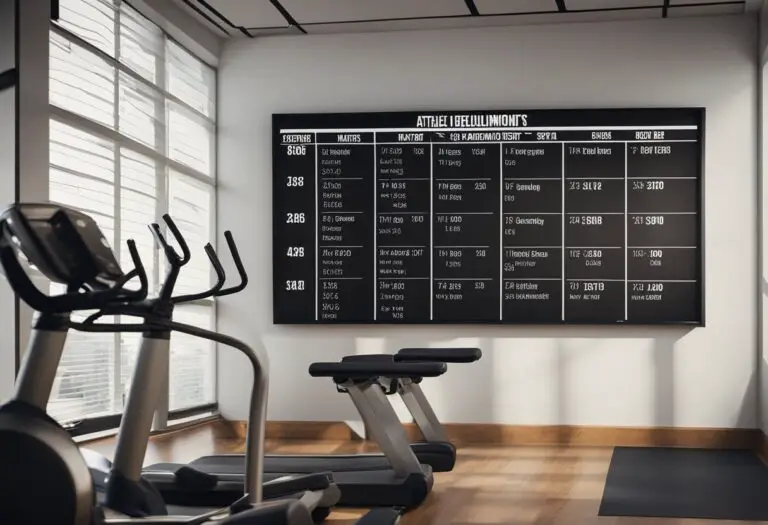How Can Mental Training Enhance Athletic Performance
How Mental Training Boosts Athletic Performance
Mental training has become increasingly popular among athletes and coaches in recent years. While physical training is essential, mental training can enhance athletic performance by improving focus, concentration, and confidence. Mental training involves various techniques such as visualization, goal-setting, and positive self-talk.

Visualization is a powerful tool used in mental training. Athletes can use visualization to picture themselves performing at their best, which can help them prepare for competition and reduce anxiety. Goal-setting is another technique used in mental training. Setting specific, measurable goals can help athletes stay motivated and focused on their training. Positive self-talk involves using encouraging statements to build confidence and overcome negative thoughts.
Overall, mental training is an effective way to enhance athletic performance. By incorporating mental training techniques into their training regimen, athletes can improve their focus, concentration, and confidence, which can lead to better performance on the field or court.
The Psychology of Athletic Performance

Cognitive Functions in Sports
Athletic performance involves a wide range of cognitive functions such as attention, perception, memory, decision-making, and problem-solving. Athletes must be able to process information quickly and accurately, and make split-second decisions in high-pressure situations. Mental training can help athletes improve their cognitive functions and enhance their performance.
One effective mental training technique is visualization, which involves mentally rehearsing specific movements, scenarios, or events. This technique can help athletes improve their attention, concentration, and spatial awareness. Another technique is self-talk, which involves using positive affirmations or cues to enhance confidence, motivation, and focus.
Emotional Regulation for Athletes
Emotional regulation is also crucial for athletic performance. Athletes must be able to manage their emotions effectively, such as anxiety, stress, and frustration, and channel them into positive energy and motivation. Mental training can help athletes develop emotional regulation skills and cope with the psychological demands of sports.
One effective technique is mindfulness, which involves being present and aware of one’s thoughts, feelings, and sensations without judgment or distraction. This technique can help athletes reduce stress, anxiety, and negative self-talk, and improve their overall well-being. Another technique is relaxation, which involves using breathing, visualization, or progressive muscle relaxation to reduce tension and promote calmness.
In conclusion, the psychology of athletic performance is a complex and dynamic field that requires a range of cognitive and emotional skills. Mental training can help athletes improve their performance by enhancing their cognitive functions and emotional regulation. By incorporating mental training into their training regimen, athletes can gain a competitive edge and achieve their goals.
Mental Training Techniques

Visualization Strategies
Visualization is a powerful mental training technique that can enhance athletic performance. Athletes can use visualization to mentally rehearse their performance, including their movements, strategies, and outcomes. This technique helps athletes to develop a strong mental image of their desired performance and helps them to stay focused and motivated.
Visualization can be done in different ways, such as guided imagery, mental rehearsal, and self-talk. Athletes can use visualization to improve their skills, overcome obstacles, and enhance their confidence. Visualization can also help athletes to manage their emotions and reduce anxiety.
Goal Setting and Self-Talk
Goal setting is another effective mental training technique that can enhance athletic performance. Athletes can use goal setting to set specific, measurable, attainable, relevant, and time-bound (SMART) goals that are aligned with their performance objectives. Goal setting helps athletes to focus their attention, prioritize their efforts, and track their progress.
Self-talk is another mental training technique that can help athletes to improve their performance. Athletes can use positive self-talk to boost their confidence, stay motivated, and manage their emotions. Positive self-talk can also help athletes to stay focused and perform at their best.
Mindfulness and Concentration
Mindfulness and concentration are two mental training techniques that can help athletes to stay focused and perform at their best. Mindfulness involves being fully present and aware of one’s thoughts, feelings, and sensations. Athletes can use mindfulness to reduce distractions, manage stress, and stay focused on their performance.
Concentration involves focusing one’s attention on a specific task or goal. Athletes can use concentration to block out distractions, stay focused on their performance, and maintain their motivation. Concentration can also help athletes to overcome obstacles and achieve their goals.
Impact of Mental Training on Physical Performance

Endurance and Mental Toughness
Mental training can have a significant impact on an athlete’s endurance and mental toughness. By practicing visualization techniques, athletes can train their minds to overcome physical fatigue and push through challenging situations. This mental toughness can give athletes the edge they need to perform at their best during competitions.
Additionally, mental training can help athletes develop a stronger sense of focus and concentration. This can be especially important during endurance events, where distractions can be detrimental to performance. By learning to stay focused and maintain a positive mindset, athletes can improve their endurance and mental toughness.
Stress Reduction and Recovery
Another way that mental training can enhance athletic performance is by reducing stress and improving recovery. High levels of stress can negatively impact an athlete’s physical performance, making it difficult to perform at their best. Mental training can help athletes develop coping mechanisms to manage stress and anxiety, allowing them to perform at their optimal level.
Moreover, mental training can help athletes recover more quickly from injuries or intense workouts. By practicing relaxation techniques and visualization, athletes can speed up the recovery process and return to training sooner.
In conclusion, mental training can have a significant impact on an athlete’s physical performance. By improving endurance and mental toughness, reducing stress, and improving recovery, mental training can give athletes the edge they need to perform at their best.
Case Studies: Mental Training Success Stories

Elite Athletes and Mental Training
Mental training has been a vital component of many elite athletes’ training regimens. One such example is Michael Phelps, who used visualization techniques to prepare for his races. Phelps would visualize every aspect of his race, from the start to the finish, including all the possible scenarios that could occur during the race. This helped him stay calm and focused during the actual race, which ultimately led to his success.
Another example is Serena Williams, who used positive self-talk to overcome negative thoughts and doubts. Williams would repeat positive affirmations to herself before and during matches, which helped her stay confident and focused on her performance.
Team Sports and Psychological Cohesion
Mental training can also be beneficial for team sports, where psychological cohesion is essential for success. The New Zealand All Blacks rugby team is a prime example of this. The team uses a mental training program called “Mental Skills for Game Day” to help players stay focused, calm, and confident during games. This program includes visualization, breathing techniques, and positive self-talk.
Another example is the Chicago Cubs baseball team, who used a mental training program called “The Cubs Way” to win the World Series in 2016. The program included mindfulness meditation, visualization, and goal-setting exercises, which helped players stay focused and motivated throughout the season.
Overall, these case studies demonstrate the effectiveness of mental training in enhancing athletic performance. By incorporating mental training into their training regimens, athletes and teams can improve their focus, confidence, and psychological cohesion, ultimately leading to better performance on the field or court.
Integrating Mental Training in Athletic Programs

Developing a Mental Training Regimen
Integrating mental training into an athlete’s regimen can be a challenging task, but it is essential for enhancing athletic performance. A mental training regimen should be developed based on the athlete’s individual needs, goals, and sport-specific demands. The mental training program should include techniques such as visualization, goal-setting, positive self-talk, and mindfulness.
Visualization is a powerful tool that enables athletes to mentally rehearse their performance, creating a mental image of their desired outcome. Goal-setting helps athletes to set specific, measurable, attainable, relevant, and time-bound goals that motivate them to achieve their desired outcome. Positive self-talk is another technique that can help athletes to overcome negative thoughts and emotions, enabling them to focus on their performance. Mindfulness is a technique that helps athletes to stay present in the moment, reducing anxiety and improving their performance.
Role of Coaches and Psychologists
Coaches and psychologists play a crucial role in integrating mental training into athletic programs. Coaches should be trained to identify the mental barriers that prevent athletes from performing at their best and should provide support to help athletes overcome these barriers. Psychologists can provide specialized mental training programs that are tailored to the athlete’s individual needs and goals.
Coaches and psychologists should work together to develop a comprehensive mental training program that includes goal-setting, visualization, positive self-talk, and mindfulness. They should also monitor the athlete’s progress and provide feedback to help them improve their mental skills.
In conclusion, integrating mental training into athletic programs is essential for enhancing athletic performance. Developing a mental training regimen that includes visualization, goal-setting, positive self-talk, and mindfulness can help athletes to overcome mental barriers and perform at their best. Coaches and psychologists play a crucial role in integrating mental training into athletic programs and should work together to develop a comprehensive mental training program that meets the athlete’s individual needs and goals.







